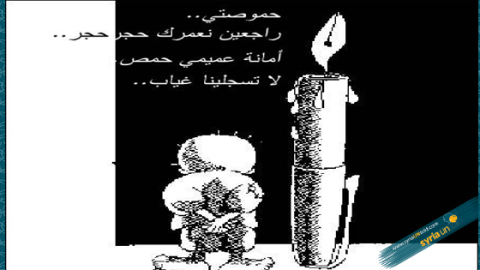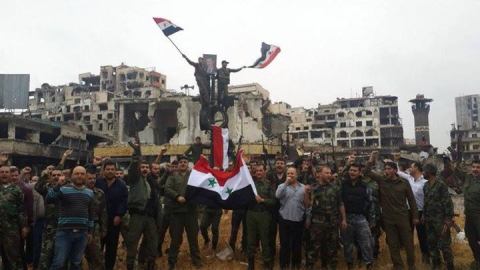Homs, the proverbial capital of Syria’s revolution, holds a special place in the minds of Syrians everywhere. It was the first large city to join the popular protests wholeheartedly, and its famous sit-in on clock square provided one of the uprising’s most iconic moments. Because of that, and because of the tragedy that unfolded in the two-year long siege on the city, the news of opposition fighters leaving the town after a truce with the regime had a devastating effect on many Syrians.
Exodus from Homs
Artist Abdulhakim Quteifan compared it to the exit of Palestinian resistance fighters from Beirut following the Israeli invasion of 1982:
“Today, as I witness these men leaving Homs, my memory takes me back to another moment of sadness, bitterness and disappointment; the day when Palestinian resistance fighters left Beirut to their exile. Homs is the greatest defeat for our revolution, both militarily and with respect to our morale.”
This comparison resonated with many young activists who have been devastated by the loss of Homs. A Facebook page called, “Homsi Handala”, was devoted to the exilees from Homs. The page was inspired by the indelible symbol of Handala, a Palestinian child refugee character drawn by the late Palestinian cartoonist Naji al-Ali. The ten-year-old child, with his back turned to the viewer, came to be the most recognizable symbol of the Palestinian tragedy, and now of the Syrian one.
Syrian filmmaker, Wiam Simav Bedirxan, who had stayed in Homs until very recently, wrote of the day: “Goodbye Homs. The mother of all letdowns. Do not forgive us, do not forgive any of us. We have let you become nothing more than stolen glance from a bus that is turning into a coffin. This shall be the last of your disappointments, goodbye Homs. You are my mother.”
A Victory of Life
Despite the tragic moment, however, some activists viewed the exit from Homs from a completely different angle. Media professional Mais Katt believes that this is in fact a victory for life over death in the uprising. Orwa al-Ahmad also affirmed this point of view: “Homs was not sold. In fact, this is the most daring decision in this revolution, and the most rational.”
Syrian poet Abdulkarim Badrakhan offers a more optimistic view of the future: “I’ve known about the details of the negotiations for three months, and I was expecting this. But today I am optimistic. I know that these fighters can liberate the city again in two hours, if they have enough ammunition and supplies. I trust them more than I trust myself.”
Beyond these two divergent views, the images of regime’s soldiers and TV crews gloating over the rubble of the old city of Homs garnered the wrath of many Syrian activists and writers. Blogger and writer Yassin Swehat succinctly summed it up thus: “Homs took two bus and went north… I congratulate Assad on his victory of rubble.”
But Homs is also the city of laughter and jokes, and even in its darkest days it has remained true to its reputation. Photographer Muzaffar Suleiman recalls a telephone conversation with one of the fighters hours after leaving the city:
- How are you, my friend? I hope it was not too difficult on the way out.
- No, it was fine, we got a bit scared though.
- Why? Did something happen on the way?
- No, nothing serious. But we were sitting in the bus, and we didn’t have any tickets, so we were afraid a ticket inspector would come.





